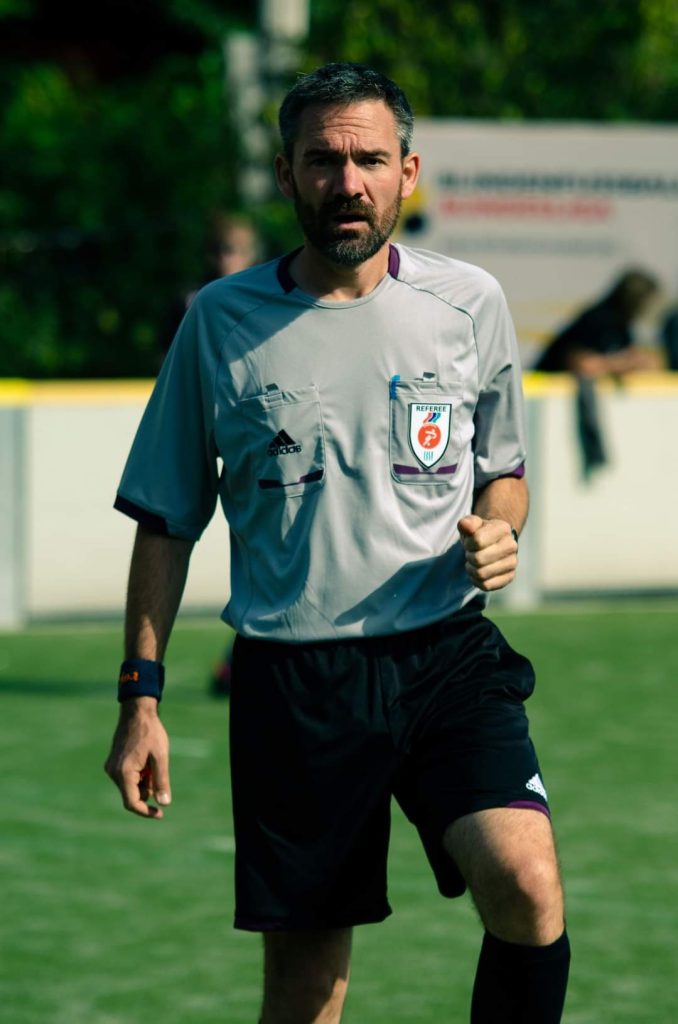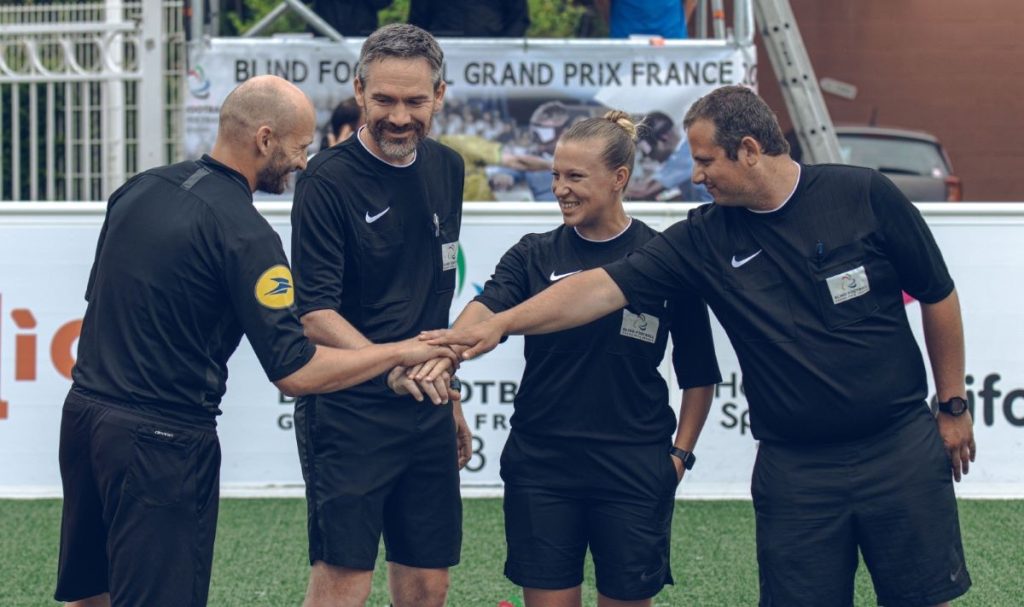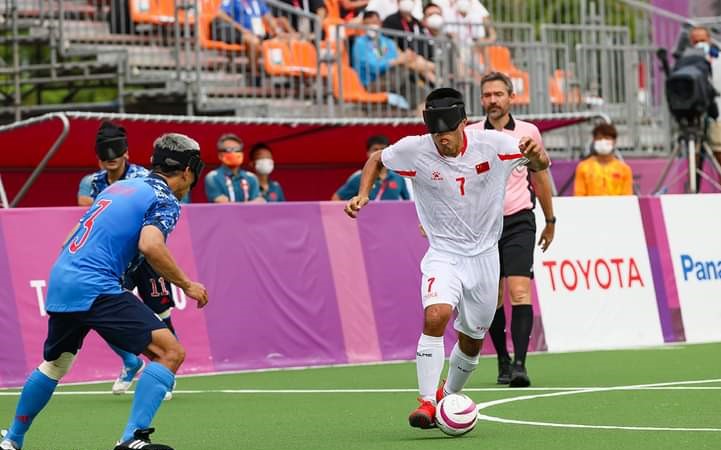The world of sports gives people around the world the opportunity to engage with others who share the same passion, even in spite of sometimes huge challenges. François Carcouët has been living in Brno for nearly two years, and he has been appointed as referee for this summer’s Paralympic Games, for the fourth time. He has been a blind football referee for three decades, and has officiated at many different competitions, including world cups and league finals.
With the UEFA Euros on-going in Germany, and ahead of the Olympic and the Paralympic games taking place in Paris this year, Brno Daily had the opportunity to talk to Carcouët about the world of blind football and his experiences as a referee.
BD: How did you get into this sport? What was your first contact with it?
In 2001 I started in France, but I have been a referee since I was seventeen. Two friends of mine had been doing it for two years already. They described blind football to me and I found it amazing and wanted to give it a try. Being a referee is a hobby.

BD: Could you describe to us how the sport looks?
It is just football but the players are blind. And if they are not totally blind, then they play with eye patches and a mask on in order to make them all equal. The rules are derived from futsal. We play on a 40x20m pitch with sideboards on both of the lateral sides so the ball doesn’t escape. And the ball has some metallic capsule inside so it makes a sound when the ball is rolling, and players know where it is. The player that has the ball doesn’t need to say anything, but the opponents, when they move towards the ball, need to say “voy” (“I go” in Spanish), so that everyone is aware. If they fail to call that, that would be a foul. Then, there is an extra position: guides. That’s why the pitch is divided into three parts. When the play or the players are in the middle both coaches can speak, but when they make it to the first third, just two people can talk: the goalkeeper to his defence and the guide behind the goal to his forwards. The goalkeeper is the only sighted player.
BD: What are the major differences of the game compared to regular football?
That the players are blind and the use of “voy”. As well as the few modifications I mentioned before: they can tackle and be tackled but of course it would be a foul. It is based on futsal rules. And the goals are a bit wider.
BD: What is the right word to describe these athletes?
The word would be blind athletes. There is no taboo. Even the verb “to see” is used in situations such as “did you see that?” It’s normal. They are normal, they just cannot see.
BD: How is the contemporary blind football scene, internationally and in the Czech Republic?
In Brazil, for example, there are over 40 teams and some are professional, they have won the paralympics in all of its five competitions so far. Argentina is also an important country for blind football. Related to Europe, Spain used to be high in the world ranking, unfortunately now it is a bit more difficult there. Japan too is very strong. They take it seriously in France, Germany and England as well. The last world cup had 16 teams from four continents. The most important tournaments are the paralympic games, like in every paralympic sport. World cups take place every four years. The next paralympics edition, in Los Angeles, will hopefully include a blind football female category for the first time; the request has been sent to the International Paralympic Committee.
In the Czech Republic, there is a team linked to MUNI here in Brno, called AVOY MU Brno. And actually that’s one of the reasons why I’m here. Indeed, they organise one of the major European tournaments, in Bučovice. I was invited to referee a few years ago, and the organiser is now my wife. I’ve been here for two years, I gave up my life in France. The 10th edition of this tournament will take place over the weekend of 28 and 29 September (more information here). I would like to mention that they have created a very friendly and professional atmosphere. I often say, and I’m not the only one, that the spirit of blind football is to be found in Bučovice.
BD: Is it a profitable business?
It is not professional, it is voluntary work. Maybe in Brazil some players get some money, but they need an extra income. Entrances in Bučovice, for example, is for free. The main thing is to enjoy the game.
BD: What does it take to be a referee?
First, in France, you need to be a referee already. I was an official referee in France for football in the 4th national division as an assistant and in the 6th as the main referee on the pitch.
I prepare the courses for the new referees with the new rules and those things. Last week I was in France for the finals, we got two new referees. People come and they have a look, but of course you need to have some previous experience being a football referee. Then they can get all of the more specific information and details.
BD: How do you deal with standing your ground and confidence as the authority on the pitch?
I would say that in football this is tougher. I started from a young age. I was shy, had low confidence, and to be a referee made me grow up faster, to be mature and be able to take responsibility, make decisions and make them quickly. So this is a very nice school of life.
In blind football most people have a different approach, you are there mostly to help the players. The relationship is different; however, at the level of paralympics we are sometimes back to being the bad guys. There are a lot of expectations from the teams, lots of pressure because the players want to win medals and these are valuable, so if they don’t get a medal because of the referee, they can get upset.
BD: What is your preparation before the Olympics?
The pitch is small but I run from 3 to 4 km in one game. So I need to be physically ready. I run, I’m currently preparing for a half marathon here in Brno and I’m running it as the guide of a blind friend. I just got back from the IBSA World Grand Prix in Strasbourg, which was a test event with almost all the qualified teams for Paris. Otherwise, with all the appointed referees, we have online meetings where we go through the rules and through some videos from previous games and previous situations. We go through every team’s record and their tactics so that we know what to expect, to be ready for the unexpected.

BD: What do you expect from this edition of the paralympics?
It will be my last olympiad, and it’s home. It’s gonna be full of emotions, for the first time my whole family will be in the stands. And also on the pitch the teams are more and more professional in their approach, that also comes with a bit more pressure. The stadium itself will be so amazing in front of the Eiffel Tower…12,000 spectators who have to stay silent while the matches are on.
BD: What kind of crowd comes to the stadium to cheer? What is the atmosphere like, considering there is a caller?
Same as in tennis, when the ball is on, they have to stay quiet, but in pauses they cheer as in any other sport. I remember in London, people at Great Britain’s games made it very difficult for their players, because every time they would be close to scoring, the noise of their own people in the crowd made them miss because they couldn’t hear the ball properly. I have a feeling this time will be the same with the French… In Rio we were playing on a former tennis court, the stands were a bit up, maybe 3 metres above the ground, so the sound was further away and that was better. Of course fans can cheer loudly when there is a goal scored.
BD: How can the people follow the sport more closely? What would you do to give it more exposure?
There is this very good YouTube channel, or you can search for it. Some competitions are streamed on TV, and the Paralympics will be of course. For example, the final at Tokyo 2020, for which I was the first referee, even reached 600 million live viewers. The best league in Europe for this is the Bundesliga, as they stream all their games at the weekend. In France they are still not so aware, so it depends on the team you like.. they do some live social media streams sometimes. But if you are living in Brno and you want to see it, you must come to BBFC in Bučovice on 28-29 September.






